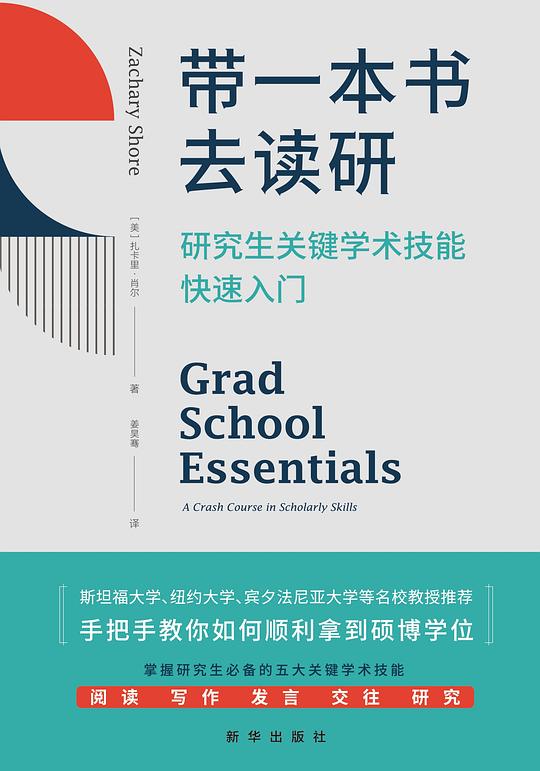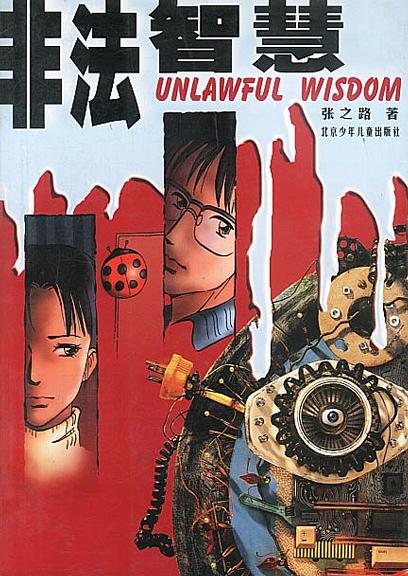
研究生必备:带一本书去读研
书名:带一本书去读研
1
0

大宝贝 2023-09-30 00:44:10
Main Points: This book mainly covers five skills: reading, writing, speaking, interpersonal communication, and research.
Reading Text Analysis: Defeating bookzombie: linear reading → non-linear reading, five-step reading method (finding thesis statement, skimming, summarizing) - Linear reading: passive reading, reading from beginning to end without a purpose. - Non-linear reading: active reading, grasping the thesis statement - Use the five-step method to locate and evaluate the authors issues, thesis statement, and key evidence. - Step 1: Analyze main and subheadings. Step 2: Read the table of contents. Step 3: Read the last section first. Step 4: Read the introduction next. Step 5: Identify the most important chapters or sections in the book or article. The most practical technique in this process is to summarize the content in your own words and write it down. Always remember to write it down after summarizing! - Compare it with your summary of the ending "golden paragraph." If they are similar, then you have likely found the thesis statement and captured its essence. - About summarizing: pick out the subject, verb, and object, abbreviate complex sentences. Summarize the main idea and skip paragraphs that repeat or deepen known viewpoints. - Introduction or conclusion: conclusion! (The introduction contains various other information) - Quickly find the thesis statement - look at the conclusion
Text Critique - Critique is the analysis of the authors argument, thoroughly examining the completeness of the authors claims. - Effective critique only discusses what the author did not do: neglecting certain content seriously affects our understanding of the topic. - Critique strategy: First, examine whether the premises are reasonable; Second, consider whether the conclusion can logically follow from the premises (can the research results be attributed to other causes?). - To provide a powerful critique, you need to: ● Clearly state the thesis statement in a paragraph. ● List the main premises and conclusions in concise sentences. ● Explain the main assumptions behind each premise. ● Question whether the conclusion can logically follow from the premises. - You can attack either the logical or empirical part of an argument. In general, you can launch an attack from three main fronts: thesis, method, and sources. - Thesis: Examine whether the conclusion logically follows from the premises. Usually, the research results are not overstated or caused by other reasons. - Method: Examine whether the research method is suitable for the content. If a different method is used, can it lead to equally reasonable alternative interpretations? Are the criteria for interpretation too high, low, wide, or narrow? - Sources: Is the source new or old? If it is new, does it genuinely contribute to our understanding, or does it merely confirm what we already know? If it is old, has the author adopted a new perspective that can change our cognitive understanding? Academic research should promote our understanding of people, events, or eras. Therefore, you should question whether the text has achieved this goal.
Writing Goal: Clarity - Brutal and frustrating truth for speaking and writing: others have no idea what you are thinking. When doing these two things, your task is to lead others on a tour of your thoughts. If you are afraid of being fully exposed, you must first do a cleanup job. Do not make the tour route a maze. - Speaking, writing, and teaching are not about testing your knowledge, but about examining your ability to explain what you know to others. - Present unexpected contents, not just well-known facts. If you must state the obvious conclusion, also tell the readers something new about old ideas.
Get to the point, use the Columbo Principle: state the problem and answer in the first paragraph - Choose one of the following three formulas for the opening paragraph: Formula 1: state the problem in the first sentence. Formula 2: state the thesis statement in the first sentence. Formula 3: write a fascinating short story for one or two paragraphs, followed by the problem and thesis statement.
Writing Style Strategy - In 1946, George Orwell published a brilliant article on politics and the English language, giving six clear writing principles: 1. Avoid using metaphors, similes, or other commonly used figures of speech. 2. Use words as concise as possible, without being lengthy. 3. Simplify sentences, be concise and explicit. 4. Use the active voice rather than the passive voice. 5. Use everyday language as much as possible, avoid foreign words, scientific terms, or professional jargon. 6. Focus on the main points. - Use subtitles (subheadings) to help organize your thoughts and guide readers through your argument. - Ensure logical fluency. - Proofreading: 1. Focus entirely when proofreading your own article. 2. Ask friends to review your draft and let them focus on this task. 3. Read your article backward, one sentence at a time (this method also helps identify spelling errors). - Add a twist to the conclusion
Speaking Two main purposes: attract and inspire - Both are important, but if you can only achieve one, please choose to inspire.
Strategies Five-step iteration method 1. State the thesis statement. 2. Write a complete speech draft. 3. Rehearse alone. 4. Rehearse in front of others. 5. Listen to feedback and start over.
HEFT 1. Start with a hook - list the points you are going to talk about. 2. Enumerate the points clearly. 3. Insert flags for transitions - inform the audience that you are moving on to the next part of the speech. 4. End with a twist - connect it to a larger issue.
Interpersonal Communication Mindset - The advice is to adjust your expectations. Not to lower them, but to adjust. Do not treat your mentor as a friend, boss, colleague, parent, or anyone else, but as a craftsman and yourself as an apprentice. Your task is to learn a craft from them.
- You must know how to withstand as little heartbreak as possible and obtain as much guidance as possible.
- Be sincere. - Avoid talking nonsense. - Try to maintain a positive attitude under normal circumstances. - If you try to understand a concept but still dont understand it, it is the teachers duty to explain it in a different way until you both find an explanation that makes you understand. People have different ways of learning, but many professors only have one method. Blaming students for their lack of comprehension is easier than blaming themselves for poor explanation skills. If they admit their fault, they need to spend more time thinking about alternative explanations, and most scholars dont have the time. Therefore, dont blame them, the overall education system is not conducive to them becoming good teachers. However, dont blame yourself either. If your mentor cannot or is unwilling to explain a concept in a way that you can understand, then find someone else who can. This may mean contacting other classmates, professors, or scholars outside the university. Seek help wherever someone can help you!
Handling Criticism: Adjust mindset, remain calm - Do not view criticism as a personal attack, separate your self-worth from the criticism. - Understand that learning a craft requires making mistakes and defending your ideas without defensiveness. - When others criticize you, nod appropriately and respond with a smile. Listen carefully to their criticism. Take notes if it helps you organize your thoughts. Note down the key phrases of their speech. Show through body language that you are paying attention to their words, not the person. This means nodding at the appropriate time or making short remarks like "Hmm" or "Yes, youre right." When they finish speaking, take some time to organize your thoughts. A few seconds of silence is acceptable, as if you are contemplating what they have said. You can close your eyes or look at the ceiling while thinking. When you are ready, respond with a smile.
- When others criticize your work, focus on how their words can make your work better. Regardless of their actual intention, assume (or imagine) that they genuinely want to help you improve.
- Your work has flaws that need improvement. This does not mean your personality has flaws; it is just a comment on a specific work you have done at a specific point in time. Therefore, understand how to make progress and then work hard.
Find a Supporter - It is important to find a professor who truly cares about and protects you. Sometimes, you will need the protection of a good professor to avoid harm from not-so-good professors, and this situation may occur more than once.
- Evaluate power dynamics as objectively as possible; avoid unpredictable professors and find a supporter; never assume others will keep their promises.
Research Research Goal: Answer a meaningful question - Many people do not understand that the question must be meaningful. The answers derived from the question must advance our understanding of a genuinely important topic.
- Understand the difference between subject, question, and answer.
Find a Question: Five-step method 1. Ask experts. 2. Find the two latest publications on your research topic. 3. Find the ten semi-new publications on your research topic. 4. Ask yourself if these publications make sense. 5. Ask experts again.
Research Strategy - Condense your question within eight words. - Do not research on obscure topics, which would render your research meaningless. Connect your question to a larger issue - something truly important. - Approach research with an open mind. The most apparent sign of intellectual limitation is closed-mindedness. - Confront adverse evidence: As a scholar, you must first collect and weigh evidence to determine its authenticity. Only then can you express your opinion in a clear and persuasive manner. You are more like a judge than a lawyer. You must evaluate all reasonable explanations impartia
相关推荐
萤火谷的梦想家
艾莉森•麦吉出生于1960年,是美国《纽约时报》畅销书作家,同时也是大都会州立大学创意写作课的教授。她的作品被翻译成20多种语言并出版,也曾被提名普利策奖,并获得苏斯博士奖金奖、克里斯托弗图书奖、美国 [美]艾莉森•麦吉/[美]克里斯托弗•丹尼斯/绘 2023-03-27 16:50:25鬼马女神捕1·绝密卧底(上)
腹黑凤凰vs毒舌鸡妖——蓝翎:“小姬,跟我去人界吧!”姬十四:“干吗?让人宰了我做小鸡炖蘑菇吗?”蓝翎:“不啊,让妖怪宰了你做小鸡炖蘑菇更气派。”凤凰蓝翎和鸡妖姬十四生活在无忧无虑的灵界。他们的故乡叫 郝天晓 2023-04-17 00:22:47© 2023-2025 百科书库. All Rights Reserved.












发表评价